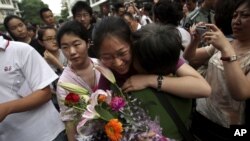China sends more students to the United States to attend American colleges than any other country in the world.
The reason, according to Shaun Rein, author of the recently published book "The End of Cheap China: Economic and Cultural Trends that Will Disrupt the World,” is that far too much of Chinese education is based on rote memorization and a lack of creativity.
“We really haven’t interviewed anyone who says that they like the current education system in China,” said Rein, who is also the founder and director of the Shanghai-based China Research Group. “Obviously China’s economy has been growing for the last 30 years, but one of their major constraints is its weak education system,” he said. “What you’ve seen in the past five to 10 years is a huge upsurge in mainland Chinese going to the U.S. to learn.”
Rein said many Chinese parents want their children to be more “well-rounded.”
“They like to learn more about critical thinking, a liberal arts education and, very importantly, they get exposed to things aside from just test taking. They learn about morality and how to be a better human,” he said.
But according to Rein, the pattern of Chinese students attending college in the U.S. may be changing, due to the sluggish U.S. economy and visa issues. He also said many Chinese want to study at a U.S. institution in their home country, and to cater to this demand, U.S. education institutions like Duke University, New York University and The Julliard School are setting up campuses in China.
Rein said those ventures are just in the beginning stages, but there are concerns about how much influence the Beijing government will have on the curriculum and how these institutions will ensure the integrity of the academic mission.
China is also making some initial steps to open up its own education system, Rein said, noting that Beijing University’s admissions have become less focused on test scores alone.
He said, however, there are concerns that a more subjective admissions system could lead to bribing admissions officers.
“Although [Chinese students and parents] dislike the emphasis on test taking and the pressure from the [tests], they still think it’s the fairest way of ensuring that the only people who get in are good enough to get in,” Rein said.
Rein said he thinks it will take China 10 to 20 years to achieve the kind of reform needed to put it in league with other industrialized nations.
“For China to really become the predominant economic and global superpower, it really has to reform its education system so the best people from around the world are attracted to China to study, rather than sending China’s top students abroad,” he said.
The reason, according to Shaun Rein, author of the recently published book "The End of Cheap China: Economic and Cultural Trends that Will Disrupt the World,” is that far too much of Chinese education is based on rote memorization and a lack of creativity.
“We really haven’t interviewed anyone who says that they like the current education system in China,” said Rein, who is also the founder and director of the Shanghai-based China Research Group. “Obviously China’s economy has been growing for the last 30 years, but one of their major constraints is its weak education system,” he said. “What you’ve seen in the past five to 10 years is a huge upsurge in mainland Chinese going to the U.S. to learn.”
Rein said many Chinese parents want their children to be more “well-rounded.”
“They like to learn more about critical thinking, a liberal arts education and, very importantly, they get exposed to things aside from just test taking. They learn about morality and how to be a better human,” he said.
But according to Rein, the pattern of Chinese students attending college in the U.S. may be changing, due to the sluggish U.S. economy and visa issues. He also said many Chinese want to study at a U.S. institution in their home country, and to cater to this demand, U.S. education institutions like Duke University, New York University and The Julliard School are setting up campuses in China.
Rein said those ventures are just in the beginning stages, but there are concerns about how much influence the Beijing government will have on the curriculum and how these institutions will ensure the integrity of the academic mission.
China is also making some initial steps to open up its own education system, Rein said, noting that Beijing University’s admissions have become less focused on test scores alone.
He said, however, there are concerns that a more subjective admissions system could lead to bribing admissions officers.
“Although [Chinese students and parents] dislike the emphasis on test taking and the pressure from the [tests], they still think it’s the fairest way of ensuring that the only people who get in are good enough to get in,” Rein said.
Rein said he thinks it will take China 10 to 20 years to achieve the kind of reform needed to put it in league with other industrialized nations.
“For China to really become the predominant economic and global superpower, it really has to reform its education system so the best people from around the world are attracted to China to study, rather than sending China’s top students abroad,” he said.









